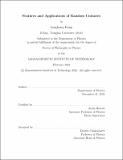Features and Applications of Random Unitaries
Author(s)
Kong, Linghang
DownloadThesis PDF (1.542Mb)
Advisor
Harrow, Aram
Terms of use
Metadata
Show full item recordAbstract
Random unitary model plays essential roles in the study of many-body quantum systems, and have many applications in the field of quantum information. In this thesis we will explore some features and applications of this model. We will first study the scrambling property of random circuits (i.e., sequential applications of random unitaries according to some interaction geometry). We will analyze the behaviors of two commonly used measures of scrambling, out-of-time-ordered correlation and entanglement, and show that the corresponding notions of scrambling can be fundamentally different. Then we will study one application of random unitaries, which is generation of near-optimal covariant quantum error-correcting codes (i.e., codes that obey some symmetry). We will show that quantum codes with U(1) and SU(d) symmetry could be generated using random unitaries with the corresponding symmetry, and the error rates of such codes typically saturate the fundamental limits. Finally, we will explore another application of random unitaries, the randomized benchmarking protocol. We will extend the randomized benchmarking framework in previous work to the setting of a continuous gate set. This allows us to benchmark arbitrary quantum gates in a unified way, which accommodates the need posed by experiments.
Date issued
2022-02Department
Massachusetts Institute of Technology. Department of PhysicsPublisher
Massachusetts Institute of Technology